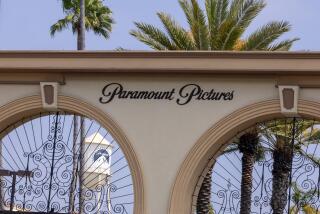ITT Rejects Hilton’s Hostile Takeover Bid
- Share via
NEW YORK — In the oddly subdued climax to a nasty, 10-month siege, ITT Corp.--owner of Caesars Palace casinos and Sheraton hotels--Wednesday repelled a $9.3-billion hostile takeover bid from Hilton Hotels Corp.
Shareholders at ITT’s long-delayed annual meeting instead voted nearly 3 to 1 to accept a friendly $10-billion offer from Starwood Lodging Trust, the nation’s third-largest real estate investment trust.
The closing of the sale, scheduled for early next year, will mark the end of the company founded in 1920 as International Telephone & Telegraph Corp. and the end of the career of ITT’s controversial Chairman Rand V. Araskog at age 65.
Despite an intense proxy fight, Beverly Hills-based Hilton was unable to win the support of such huge ITT holders as mutual fund giant Fidelity Investments.
According to preliminary results of a vote that many thought would be a cliffhanger, ITT’s slate of directors garnered the support of about 65 million shares, versus 25 million for Hilton’s rival slate.
Had the votes of just two large institutional stockholders gone the other way, Hilton would have won, Stephen F. Bollenbach, president and chief executive, asserted in a news conference after the vote. He declined to name the holders, but Fidelity presumably was one.
“Sometimes the best deals are the ones you don’t get,” Bollenbach added.
Hilton had offered $80 per ITT share; Starwood offered $85. Both bids included a mix of stock and cash, making it hard for analysts to decide which represented the higher value.
In full-page newspaper ads, Hilton argued that the Starwood offer was riskier because the stock of the Phoenix-based enterprise was overvalued.
Starwood pointed to its strong growth, fueled by stellar stock performance. In its biggest deal before ITT, Starwood in September agreed to acquire Westin Hotels & Resorts for $780 million. Starwood shares have risen 54% this year, despite a recent tail-off.
Hilton complained that ITT and its board refused to negotiate for months after its initial $55-a-share offer last January, It was only after Hilton won a court ruling blocking ITT’s effort to split itself into three companies that Hilton was given access to key financial documents.
In a separate news conference, Araskog implied that Hilton could have won had its opening bid been higher. He said that when he first saw the fax copy of the bid, he mistakenly thought the number was $85.
Even at $75, Araskog said, “I think the board would have found it very difficult not to negotiate.”
Bollenbach disputed that. “I don’t think there was a price at which that [ITT board] was prepared to sell,” he said.
Given the surprisingly lopsided vote, the day’s only real emotion came when Araskog complained to reporters that the pressure from Hilton had forced ITT to prematurely sell such prime assets as its 50% stake in Madison Square Garden.
“What are we doing to ourselves?” he asked, when the only companies able to pursue long-term goals are those that control a super-majority of their own stock.
Araskog also lashed out at critics, who have accused him of enriching himself and protecting his job at shareholders’ expense.
“I love my job,” he said, “and whatever I do from here on out, I’m going to like that too, whether you like it or not.”
One of Araskog’s sharpest critics, New York arbitrager Guy P. Wyser-Pratte, lit into the ITT chief again Wednesday, calling him “Mr. Me-First.”
“As a West Pointer, he ought to have learned that the troops are supposed to eat before the generals,” Wyser-Pratte said.
Arbitragers buy stock in takeover targets, hoping to profit as bidding escalates.
Wyser-Pratte, whose firm held 600,000 ITT shares and favored the Hilton bid, said he sold much of his position Tuesday, anticipating Starwood’s victory.
“I think that HOT [Starwood’s ticker symbol on the New York Stock Exchange] is about to become cool,” he said.
Indeed, Starwood shares have dropped more than 10% in the last week, closing Wednesday at $54.31, down 94 cents.
ITT shares fell 81 cents to close at $75.31, and Hilton gained 25 cents to close at $31.25. All trade on the New York Stock Exchange.
Barry S. Sternlicht, Starwood chairman, said he would “run like heck” to complete the transaction by Jan. 31, after which time Starwood would have to make interest payments to ITT shareholders under a penalty clause.
To address speculation that Starwood would end up selling ITT’s casinos to Hilton anyway, Sternlicht said he wanted to give his managers about 18 months to operate the gaming properties before deciding whether to sell.
Sternlicht said Starwood had a “competitive advantage” in the proxy fight because “the institutions know our stock.” Fidelity, with about 8%, and Prudential Insurance Co. of America, with a 5% stake, are the trust’s two biggest holders.
Bollenbach countered that if Starwood had any competitive advantage, it was its controversial, tax-advantaged structure. As a so-called paired-share real estate investment trust, Starwood enjoys a special tax loophole that Congress closed in 1983 but “grandfathered” to four companies, one of which Starwood acquired two years ago.
Hilton’s assault on ITT sometimes got personal. Bollenbach, for example, once referred to Araskog as a “weenie.”
But the two CEOs shrugged off any lingering bad feeling Wednesday. At the close of the annual meeting, Bollenbach approached Araskog, they shared a few words and shook hands.
* BEATEN BUT UNBOWED: Hilton remains a powerful force. D2
More to Read
Inside the business of entertainment
The Wide Shot brings you news, analysis and insights on everything from streaming wars to production — and what it all means for the future.
You may occasionally receive promotional content from the Los Angeles Times.









